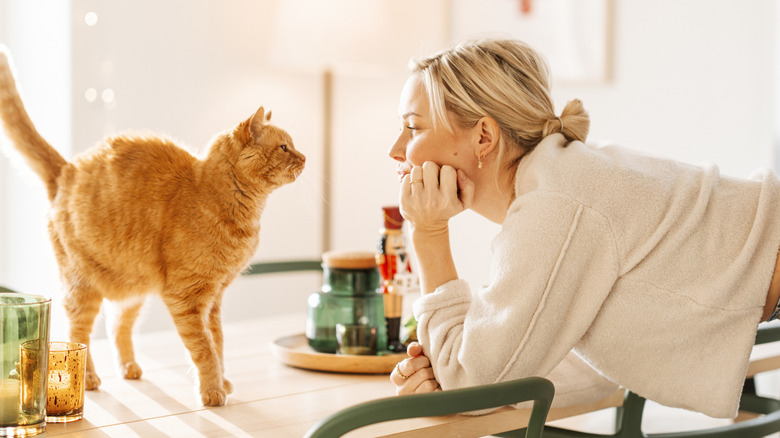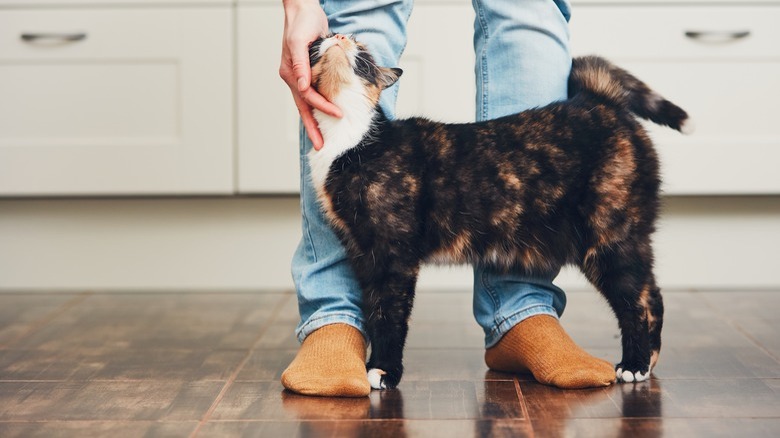Does My Cat Know When I'm Drunk?
We've all been there: after too many margaritas on Taco Tuesday or a boozy brunch heavy on mimosas, you stumble in the front door and come face-to-face with your cat. Because your kitty obviously rules the house, you read a lot into the stare she gives you as you stumble to the fridge for a drink of water.
You may have assumed that being an adult meant you didn't have to deal with judgment about where you've been and what you've been drinking, but then, your cat seems to be acting differently around you than you're used to. Remember, you probably smell pretty strongly of alcohol, you're stumbling and moving unusually, and your voice probably sounds different. Though cats may not know what getting drunk is, they are extremely smart animals. You're not wrong to suspect that they understand something is different. But how much do they know? How bad do you really need to feel that your cat caught you coming home drunk?
Stop trying to hide it, because your cat knew what was up the second you walked in the door.
While wasted, many of us mistake our feeble acting skills for something worthy of an Oscar. By walking "normal" and talking "totally not slurred," we think our impression of ourselves is so flawless that no one can tell we've had too many at the bar. Well, that act rarely works on our human friends, and it definitely won't work on our cats.
Cats basically spend their whole lives watching us. They study us, learn our behaviors, and, most crucially, come to understand how to get what they want from us. Cats even learned to understand certain gestures from their humans that were associated with food, so they've got a pretty solid understanding of our body language. Dr. Gary Weitzman, author of How to Speak Cat explained, "They pick up our facial expressions, body postures, moods, and emotions. This is even more intense when they know us well. And they certainly pick up on changes and mood shifts very quickly." So while we might be trying to act as normal as possible, our cats are so well-versed in our postures and movements that they most likely immediately noticed that something was up.
Your cat might think you're sick and try to help.
The internet is full of harrowing tales in which cats helped to alert someone when their humans were in trouble. Cats can detect illness or trouble with their humans, but they wouldn't really know the difference between alcohol and something worse, so they might assume you're sick. So if your cat behaves differently when you're under the weather, you may notice similar behaviors kick in when you come home drunk (or wake up hungover the next morning).
Your cat also might be a little weirded out by your drunken state.
Unlike dogs, cats don't quite understand that we're a different species. In fact, research suggests that cats think we are just bigger cats, and more specifically, they treat us like we're their mama cat. Dr. John Bradshaw, Director of the Anthrozoology Institute at the University of Bristol, explained, "Almost all domestic cat social behavior must have started out as mother-kitten behavior. Their ancestors were solitary, territorial animals, and the only friendly behavior between two cats would have been between mothers and their kittens." Our cats also love to manipulate us like they would a mother cat.
So when we come home in an inebriated state, that might be a little worrying for our cats. Imagine (or remember) a time that you caught your parent drunk and consider how funny, but also disconcerting that can be. Because our cats feel such a close bond to their humans, they might seem a little more nervous than usual seeing their human in such a different state.
Cats are also very attuned to the emotional cues we give them. In a study, cats and their humans were in a room with a fan that had streamers on it. The humans were asked to respond to the fan in fear, happiness, and a neutral emotion, and researchers found that the cats usually looked to their owner to gauge their response to the fan before reacting. The exaggerated emotions of drunkenness mean we're probably giving our cats some heightened and confusing emotional cues that they aren't used to, so if they react a little unsure, that's probably why.
But don't worry, your cat knows a little about what you're going through.
When we imbibe, the alcohol releases endorphins (aka happiness hormones) in our brains, which causes that pleasant, drunken feeling. Cats have a similar drug. The plant catnip causes a euphoric response in the kitty brain that isn't the same as alcohol, but it has some similarities. So our cats have some idea of what it feels like to have an outside element make us behave crazily. There isn't enough research to tell us whether cats understand a complex emotion like empathy, but it's comforting to know that cats might understand a little of what we're going through while we're eating ice cream with a fork on the floor of the kitchen.
Because if there's one thing we're sure of, drunk or sober, our cats will always be there for us. They may be quietly judging us while they purr, but hey, they're still there. And that's what counts.

